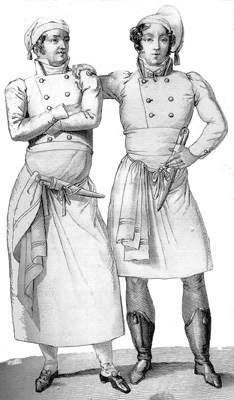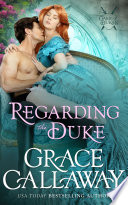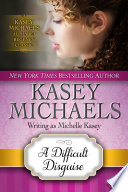Regency Reader Question
For the aristocracy, it was apparently all the rage to have a male French chef. However, the references I’ve found said that such men were expensive, so most English aristocracies used women cooks instead. Oddly, I can’t find a single mention of female French cooks, as opposed to male French chefs. Was it still The Thing to have a female French cook (posh, posh!) vs an English cook (oh, my dear)… Or did you simply not talk about it if you were using a female cook? Did it even matter whether the cook was French or English once you tossed the male French chef out the window?
| Source of Question | Research |
| Additional comments |
Thanks for the question, TKH!
The long and short of it is this question reveals sexism deeply entrenched in the culinary world and the perceived difference between a chef and a cook.
The Celebrity Chef emerged as a thing in the late 16th with decadent royal get togethers in Europe. By 17th century, chefs were highly revered (https://www.huffpost.com/entry/cooking-art-history-feast_b_8561012). The French, in particular, were great at writing cookbooks and otherwise evangelizing/monetizing their profession. Their cookbooks also succeeded in beginning to establish national differences in cuisine.
Culinary schools weren’t really a thing until the late 19th century, so a degree was not at that time the distinction between chef/cook. The term comes from French (early 19th century) meaning head or “skilled cook” (https://www.merriam-webster.com/words-at-play/history-of-the-word-chef). I think more likely that employing the word Chef would have been posturing and limited in everyday use and, perhaps, refer to a cook who primarily served French cuisine, as opposed to English cooking.
Male cooks, because of sexism, earned higher incomes and so women were often a more affordable choice for households (Notaker, 2017) In households with stricter budgets, a cook would have also been expected to do other chores or the lady of the house would have been expected to do some/most/all of the cooking (Notaker, 2017) This saw the introduction of “domestic arts” and “household economy” into education for females, including many of the instructional books that I share on this blog (Notaker, 2017). This increased the divide between chefs and cooks, one that arguably still exists (although a bit blurrier) when considering the framing and treatment of female versus male chefs. I have been watching a lot of Food Network lately, and its striking how women are framed with the motherly, nurturing, homemaker lens while men tend to be treated with a celebration of aggression/masculinity/invention. I know that isn’t exclusively true, so don’t @ me, but it’s enough of a theme that its noticeable.
Women didn’t have the opportunity for culinary apprenticeships like some men may have access to. This added to their lack of prestige:
Culiary guilds were comprised mostly of men, and further limited a female cook’s educational opportunities (Davis, 2013).
England, also, took some time to catch up to French’s praise of the culinary master. Writing in 1822, Launcelot Sturgeon compared London cooks whose “talents…languish unknown to fame” compared with French cooks were lauded as masters of art and skill (Mennell, 1996).
So the answer is, that in the 19th century female always equals cook. French male probably equals chef. And even then, it would be an expression or imitation of French culinary culture to pronounce the French male cook a chef, probably serving both the chef’s vanity and the master’s.
Davis, J. (2013). Defining Culinary Authority: The Transformation of Cooking in France, 1650-1830. LSU Press.
Mennell, S. (1996). All Manners of Food: Eating and Taste in England and France from the Middle Ages to the Present. University of Illinois Press.
Notaker, H. (2017) A History of Cookbooks: From Kitchen to Page Over Seven Centuries. University of California Press.
To read about a French celebrity chef who cooked for Prinny, check out this post: https://judeknightauthor.com/2016/09/24/the-king-of-chefs-and-the-chef-of-kings/










